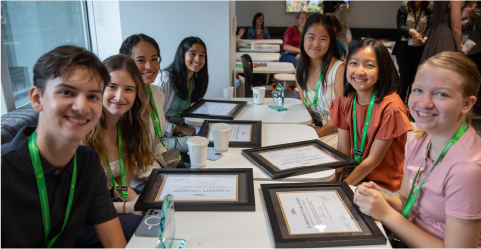SAVE THE DATE

Join us for the virtual 2024 Slingshot Challenge Awards airing on Wednesday, May 8, 2024 at 10:30 a.m. EDT
on the National Geographic Education Youtube channel.
The Slingshot Challenge has inspired young changemakers across the world to use their voice and ingenuity to tackle the planet’s most pressing environmental topics. Tune in to watch the power of young people making a positive impact in the world!
Celebration airs Wednesday, May 8, 2024 at 10:30 a.m. EDT
THE SLINGSHOT CHALLENGE
We believe that no problem is unsolvable and that great ideas come from ALL places.
Our community of 13–18 year olds rose to the challenge and created 1-minute videos describing their ideas for solving environmental issues.
We believe that, together, our ideas can lead to taking action to protect our planet and improve our future.
Want to stay updated on the next Slingshot Challenge? Sign up below!
Meet the 2023 Award Recipients

Slingshot Community
Meet some of last year's applicants, view their video submissions, and see what makes the Slingshot Challenge so incredible: Ideas from youth like you.
Follow the Slingshot Challenge on TikTok @natgeoslingshot | Questions? slingshot@ngs.org
Slingshot Challenge is supported by the National Geographic Society and the Paul G. Allen Family Foundation and is an affiliate collaborator with The Earthshot Prize.
Photo credits (from top of page): Costanza Piccoli/National Geographic, Rolf Sjogren